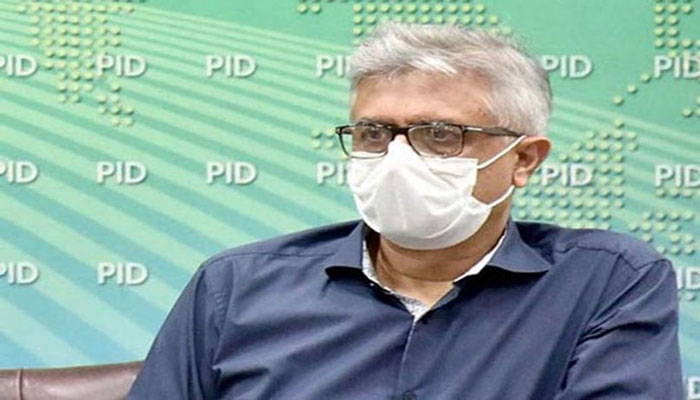Efforts on to mobilise domestic resources to end AIDS by 2030, says Dr Faisal
Islamabad: The PM’s Special Assistant on Health Dr. Faisal Sultan Thursday pledging to lead efforts towards increased government spending to cover all aspects of the National HIV response, especially along the HIV prevention and treatment cascade, by mobilising domestic resources and integrating HIV services into the health system.
Speaking at a World AIDS Day event organised by the Ministry of National Health Services, in collaboration with relevant partners, and the Common Management Unit (CMU) for AIDS, TB, and Malaria, Dr. Faisal reaffirmed Pakistan’s commitment to ending HIV/AIDS by 2030. The event was attended by diplomats, representatives of United Nations Country Team (UNCT); UNAIDS, the Global Fund to Fight AIDS, Tuberculosis and Malaria (GFATM); Health, Population, Nutrition and Health Development Partners, Association of People Living with AIDS (APLHIV) and other community-based organisations working on HIV.
The theme for this year’s World AIDS Day is ‘End Inequalities. End AIDS. End Pandemics.’ The AIDS epidemic in the Asia-Pacific is rising. There has been a significant increase in the number of people living with HIV in Pakistan, with 84% of these new infections occurring between 2010-2021.
Dr. Faisal shared that the Ministry has been working closely with provinces to increase engagement with communities in a bid to halt the spread of new infections. “With support from GFATM, we are providing free HIV diagnostic, treatment, care and support services to people living with HIV through dedicated HIV treatment centers. Even multi-month dispensation has been ensured during lockdowns through door-to-door service provision,” he added.
Dr. Faisal further said, “We devised national and provincial AIDS Strategies, setting the plan of action for 2021-2025 that shows support from the government to create an enabling environment with multi-sectoral engagement to address legislative, socio-cultural-economic, religious, political, legal, and financial determinants that can influence HIV awareness, education, prevention, care, treatment, and support initiatives.”
UNAIDS Country Director for Pakistan and Afghanistan Yuki Takemoto, said HIV/AIDS still threatens the world including Pakistan. Sharing his opinion, UN Resident Coordinator Julien Harneis said, that for the course corrections, we need to end AIDS as it will also protect Pakistan against future pandemics. “We need a paradigm shift in health financing and invest in community-led, human rights-based, gender transformative responses, essential workers, equitable access to life-saving medicines, data systems that can detect inequalities, and rights-based approaches that address those inequalities,” he explained.
Asghar Satti, National Coordinator of Association of People Living with HIV and AIDS, stressed for HIV testing to ensure that all people living with HIV can lead a healthy and productive life. “Both AIDS and COVID-19 can be ended, and future pandemics can be prevented with strong political leadership, action and accountability,” he remarked. The ceremony was followed by an exhibition of handicrafts.
-
 AI Copyright Battle: ByteDance To Curb Seedance 2.0 Amid Disney Lawsuit Warning
AI Copyright Battle: ByteDance To Curb Seedance 2.0 Amid Disney Lawsuit Warning -
 Savannah Guthrie In Tears As She Makes Desperate Plea To Mom's Kidnappers
Savannah Guthrie In Tears As She Makes Desperate Plea To Mom's Kidnappers -
 Canada’s Defence Industrial Strategy Targets 125,000 Jobs And Export Growth
Canada’s Defence Industrial Strategy Targets 125,000 Jobs And Export Growth -
 Tre Johnson, Former NFL Guard And Teacher, Passes Away At 54
Tre Johnson, Former NFL Guard And Teacher, Passes Away At 54 -
 Jerome Tang Calls Out Team After Embarrassing Home Defeat
Jerome Tang Calls Out Team After Embarrassing Home Defeat -
 Cynthia Erivo Addresses Bizarre Rumour About Her Relationship With Ariana Grande
Cynthia Erivo Addresses Bizarre Rumour About Her Relationship With Ariana Grande -
 Prince Harry, Meghan Markle Spotted Cosying Up At NBA All-Star Game
Prince Harry, Meghan Markle Spotted Cosying Up At NBA All-Star Game -
 Lady Gaga Explains How Fibromyalgia Lets Her 'connect With People Who Have It'
Lady Gaga Explains How Fibromyalgia Lets Her 'connect With People Who Have It' -
 Metro Detroit Weather Forecast: Is The Polar Vortex Coming Back?
Metro Detroit Weather Forecast: Is The Polar Vortex Coming Back? -
 Daniel Radcliffe Reveals Surprising Way Fatherhood Changed Him
Daniel Radcliffe Reveals Surprising Way Fatherhood Changed Him -
 ‘Disgraced’ Andrew At Risk Of Breaking Point As Epstein Scandal Continues
‘Disgraced’ Andrew At Risk Of Breaking Point As Epstein Scandal Continues -
 Alan Cumming Shares Plans With 2026 Bafta Film Awards
Alan Cumming Shares Plans With 2026 Bafta Film Awards -
 OpenClaw Founder Peter Steinberger Hired By OpenAI As AI Agent Race Heats Up
OpenClaw Founder Peter Steinberger Hired By OpenAI As AI Agent Race Heats Up -
 Kate Middleton's Reaction To Harry Stepping Back From Royal Duties Laid Bare
Kate Middleton's Reaction To Harry Stepping Back From Royal Duties Laid Bare -
 Rose Byrne Continues Winning Streak After Golden Globe Awards Victory
Rose Byrne Continues Winning Streak After Golden Globe Awards Victory -
 Ice Hockey Olympics Update: Canada Stays Unbeaten With Dominant Win Over France
Ice Hockey Olympics Update: Canada Stays Unbeaten With Dominant Win Over France




